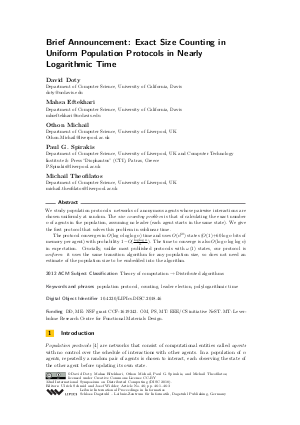Brief Announcement: Exact Size Counting in Uniform Population Protocols in Nearly Logarithmic Time
Authors David Doty, Mahsa Eftekhari, Othon Michail, Paul G. Spirakis, Michail Theofilatos
-
Part of:
Volume:
32nd International Symposium on Distributed Computing (DISC 2018)
Part of: Series: Leibniz International Proceedings in Informatics (LIPIcs)
Part of: Conference: International Symposium on Distributed Computing (DISC) - License:
 Creative Commons Attribution 3.0 Unported license
Creative Commons Attribution 3.0 Unported license
- Publication Date: 2018-10-04
File

PDF
LIPIcs.DISC.2018.46.pdf
- Filesize: 284 kB
- 3 pages
Document Identifiers
Subject Classification
ACM Subject Classification
- Theory of computation → Distributed algorithms
Keywords
- population protocol
- counting
- leader election
- polylogarithmic time
Metrics
- Access Statistics
-
Total Accesses (updated on a weekly basis)
0Document
0Metadata
Abstract
We study population protocols: networks of anonymous agents whose pairwise interactions are chosen uniformly at random. The size counting problem is that of calculating the exact number n of agents in the population, assuming no leader (each agent starts in the same state). We give the first protocol that solves this problem in sublinear time. The protocol converges in O(log n log log n) time and uses O(n^60) states (O(1) + 60 log n bits of memory per agent) with probability 1-O((log log n)/n). The time to converge is also O(log n log log n) in expectation. Crucially, unlike most published protocols with omega(1) states, our protocol is uniform: it uses the same transition algorithm for any population size, so does not need an estimate of the population size to be embedded into the algorithm.
Cite As Get BibTex
David Doty, Mahsa Eftekhari, Othon Michail, Paul G. Spirakis, and Michail Theofilatos. Brief Announcement: Exact Size Counting in Uniform Population Protocols in Nearly Logarithmic Time. In 32nd International Symposium on Distributed Computing (DISC 2018). Leibniz International Proceedings in Informatics (LIPIcs), Volume 121, pp. 46:1-46:3, Schloss Dagstuhl – Leibniz-Zentrum für Informatik (2018)
https://doi.org/10.4230/LIPIcs.DISC.2018.46
BibTex
@InProceedings{doty_et_al:LIPIcs.DISC.2018.46,
author = {Doty, David and Eftekhari, Mahsa and Michail, Othon and Spirakis, Paul G. and Theofilatos, Michail},
title = {{Brief Announcement: Exact Size Counting in Uniform Population Protocols in Nearly Logarithmic Time}},
booktitle = {32nd International Symposium on Distributed Computing (DISC 2018)},
pages = {46:1--46:3},
series = {Leibniz International Proceedings in Informatics (LIPIcs)},
ISBN = {978-3-95977-092-7},
ISSN = {1868-8969},
year = {2018},
volume = {121},
editor = {Schmid, Ulrich and Widder, Josef},
publisher = {Schloss Dagstuhl -- Leibniz-Zentrum f{\"u}r Informatik},
address = {Dagstuhl, Germany},
URL = {https://drops.dagstuhl.de/entities/document/10.4230/LIPIcs.DISC.2018.46},
URN = {urn:nbn:de:0030-drops-98359},
doi = {10.4230/LIPIcs.DISC.2018.46},
annote = {Keywords: population protocol, counting, leader election, polylogarithmic time}
}
Author Details
- Department of Computer Science, University of Liverpool, UK and Computer Technology Institute & Press "Diophantus" (CTI), Patras, Greece
Funding
DD, ME: NSF grant CCF-1619343. OM, PS, MT: EEE/CS initiative NeST. MT: Leverhulme Research Centre for Functional Materials Design.
References
-
Dan Alistarh, James Aspnes, David Eisenstat, Rati Gelashvili, and Ronald L Rivest. Time-space trade-offs in population protocols. In SODA, 2017.

-
Dan Alistarh, James Aspnes, and Rati Gelashvili. Space-optimal majority in population protocols. In SODA, 2018.

-
Dan Alistarh and Rati Gelashvili. Polylogarithmic-time leader election in population protocols. In ICALP, 2015.

-
Dana Angluin, James Aspnes, Zoë Diamadi, Michael J. Fischer, and René Peralta. Computation in networks of passively mobile finite-state sensors. Distributed Computing, 18(4):235-253, 2006.

-
Dana Angluin, James Aspnes, and David Eisenstat. Stably computable predicates are semilinear. In PODC, 2006.

-
Dana Angluin, James Aspnes, and David Eisenstat. Fast computation by population protocols with a leader. Distributed Computing, 21(3):183-199, 2008.

-
Petra Berenbrink, Dominik Kaaser, Peter Kling, and Lena Otterbach. Simple and Efficient Leader Election. In SOSA, 2018.

-
Andreas Bilke, Colin Cooper, Robert Elsässer, and Tomasz Radzik. Brief announcement: Population protocols for leader election and exact majority with O(log² n) states and O(log² n) convergence time. In PODC, 2017.

-
Leszek Gasieniec and Grzegorz Stachowiak. Fast space optimal leader election in population protocols. In SODA, 2018.

-
Yves Mocquard, Emmanuelle Anceaume, James Aspnes, Yann Busnel, and Bruno Sericola. Counting with population protocols. In NCA, 2015.

